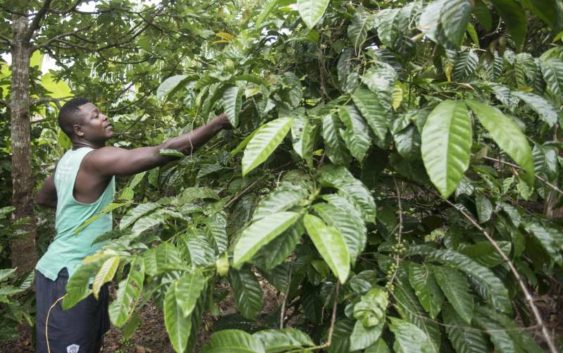- Governor Sanwo-Olu flags off Ojota-Opebi Link Bridge, to be completed in 20 months
- Allow Nigeria go to 2022 World Cup, don’t play qualifiers – Ghana Parliament member tells Black Stars
- There was no second sex tape, Kim Kardashian refutes Kanye West’s claims
- Jaruma Remanded In Prison Over Post On Regina Daniels And Ned Nwoko
- Lanre Gentry confirms paternity of last son with Mercy Aigbe, says ‘He’s my son’ (Photo)
Ghana Seeks $300 Million to Prop Up Loss-Making Cocoa Board

Ghana is in talks with lenders for $300 million in loans to support the country’s loss-making cocoa regulator.
Ghana Cocoa Board, which oversees sales and purchases in the world’s second-biggest grower of the chocolate-ingredient, needs 1.1 billion cedis ($223 million) to meet its commitments for the annual season through September, according to a document that was submitted to lawmakers on Dec. 22. The board recorded a shortfall of 2 billion cedis in the previous harvest, it said.
The proceeds of the loan will be used to refinance 1.4 billion cedis in so-called cocoa-bills that were sold in the previous season, some at rates of as much as 18.3 percent, according to the document. The board is in talks with a syndicate of lenders including Cooperative Rabobank UA and Societe Generale SA to borrow the money at 295 basis points over Libor, it said.
This year the board has sold almost 2 billion cedis of the securities.
Ghana’s cocoa regulator is struggling to cover its expenses after keeping farmers’ minimum pay unchanged for three seasons straight, even though prices have declined from highs that were reached mid-2016.

© CRISTINA ALDEHUELA/AFP/Getty Images FILE – A worker tends to Robusta coffee plants on a coffee farm in the village of Leklebi Agbesia in the Volta Region of Ghana on August 23, 2017.While cocoa rebounded in 2018, forecasts of bumper crops from West Africa’s biggest growers have again weighed on prices since the beginning of the year.
The loan will be repaid over three years after a one-year moratorium, according to the document. The board will set aside 50,000 tons of beans per year at a projected price of $2,200 per ton to service the agreement, it said. Futures contracts in London traded at 1,627 pounds ($2,128) per ton at 1:36 p.m. on Friday.
The plan will allow Ghana “to prolong the maturity of our debts,” Finance Minister Ken Ofori-Atta said by phone. “We expect this to allow us the fiscal space to develop the cocoa industry.”